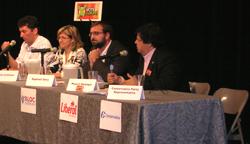It was perhaps prescient that in one of the region’s oldest theatre spaces, the future of this country’s arts and cultural funding was being discussed.
The hall itself was filled to capacity, people standing along the side aisles and spilling into the lobby Sep 24. The main attraction at the University of Ottawa’s Academic building was a town hall hosted by Vote Culture.
Vote Culture, a group formed on the eve of the election to encourage discussion of federal arts policies, held the meeting in order to ask members of all five political parties about arts and culture funding.
The impetus was $45 million in funding cuts by the Conservative government, some of which were diverted to pay for the opening ceremonies of the Vancouver 2010 Olympics.
Political representatives to the town hall included Ottawa Centre incumbent Paul Dewar for the NDP, Bloc Québécois candidate Raphaël Déry from Hull-Aylmer, Green Party candidate Sylvie Lemieux from Glengarry-Prescott-Russell, and Ottawa-Vanier incumbent Mauril Bélanger for the Liberals. The Conservatives declined to send a representative.
Facing a panel of six members from the arts and — in one case — business communities, the politicians took questions on their party’s plans for arts funding, for their visions of arts and culture in Canada, and the role of government in sectors like film and television production.
The Greens had little in the way of concrete policy — only a commitment to sit down with stakeholders to discuss their issues. So while the Bloc concerned itself mostly with the cultural implications for Québec, it was Dewar and Bélanger that provided the most substantive answers.
Dewar says the arts define “who we are as a country” and promises that his party would reverse the cuts.
Bélanger, the vice-chair of the Canadian Heritage committee, says that his party would not only reverse this last round of cuts, but would also reverse cuts made in 2006 to funding that allowed Canadian embassies to showcase Canadian arts and culture abroad, and promised to double the funding to the Canada Council.
He points out that in the 2006 election, the Conservatives said that they would match the Liberal promise to double said funding, and that funding never materialised.
Bélanger also raises the alarm on an issue that has seen little play in the media — that the Canadian Revenue Agency has announced new regulations that would deny groups the ability to issue tax receipts for donations “if the donations are used for something that is contrary to public policy.”
“I’m very worried that this is indeed another way by the backdoor of either censorship or major advocacy chill, which this government has been very good at,” Bélanger says.
That the regulations employ “very similar language if not the exact same [as C-10],” is an issue of “very grave concern.”
The event attracted not only members of the city’s arts community, but also other concerned citizens including Bruce House executive director Jay Koornstra.
“I thought it was very important to support this,” Koornstra says. “Culture is really important. The artists here, at National Arts Centre and other artists have been very kind to Bruce House and support us by offering us tickets to go to shows and plays and musical things that normally our clients couldn’t afford to go to.”
“But I also maintain that culture is an important part of health and wellness for all of us.”


 Why you can trust Xtra
Why you can trust Xtra


